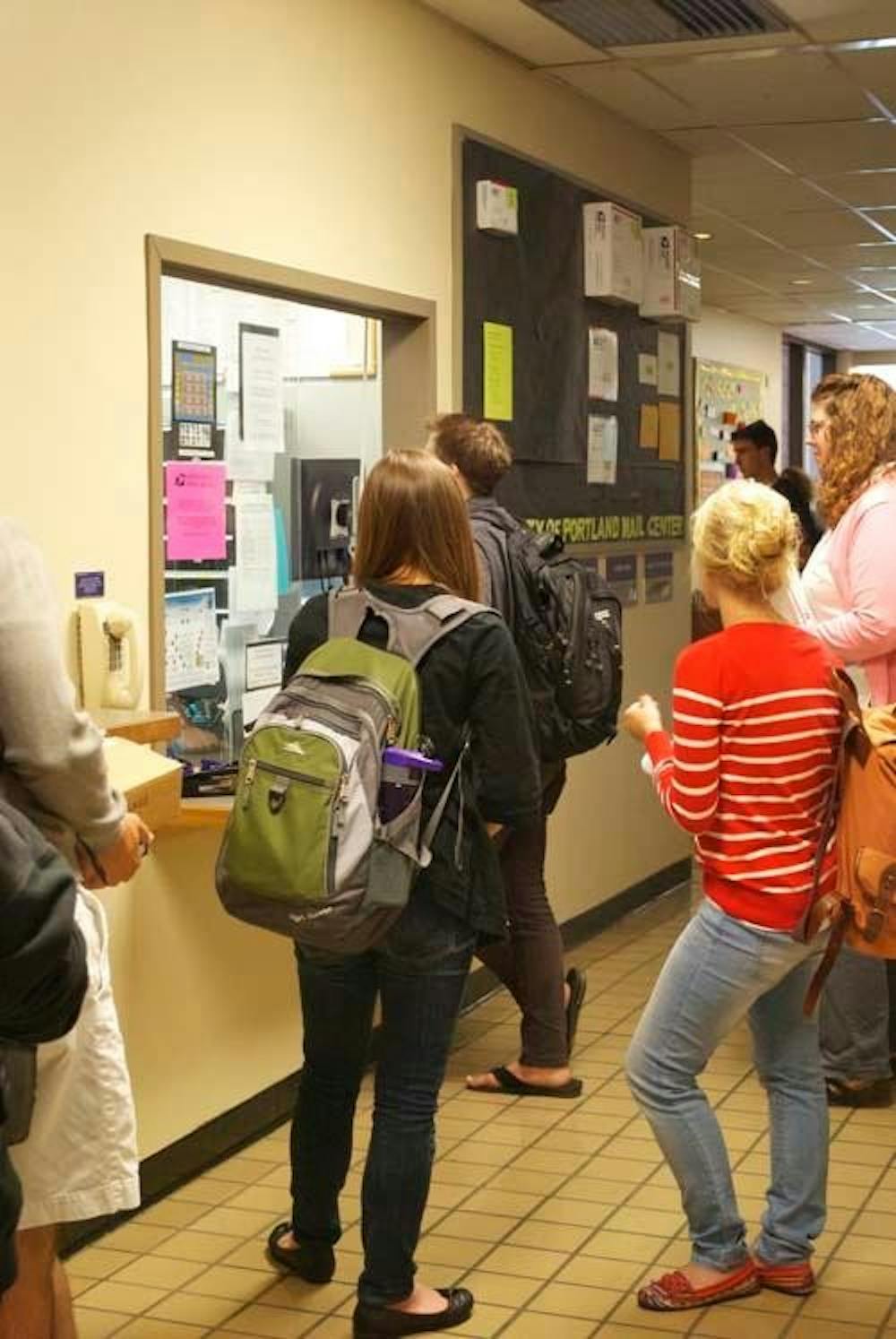After 20 percent of the student employment budget was cut last spring, departments and students try to adapt
Students wait to be helped at the Mail Center in Buckely Center. Be- cause of the cut to the student employment budget, student workers can only work only 20 hours a week on campus. (Kayla Wong | The Beacon)
By Kelsey Thomas, Staff Writer thomask15@up.edu
The 20 percent decrease in University funding for student employment, announced in May has caused departments to make adjustments this fall.
Some departments had to cut full positions, and now all students employed on campus are allowed to work a maximum of 20 hours a week.
Senior Library employee Shanay Heely has not noticed a huge change in her position this year, but acknowledges problems that could arise. Due to the new limit on hours, students who have already worked close to 20 hours will not be able to pick up additional shifts that week.
"I also work the front desk at the gym and I've been concerned that it will be hard to find people to cover if we're all bumping up against that 20 hour limit," Heely said.
Sophomore library employee James Oliver is also noticing the impacts of the limit.
"I have to be more conscious about the number of hours I do take on during the week knowing that the school caps how much you can make," Oliver said.
For students whose hours were significantly cut, however, the 20 hour limit is the least of their worries.
Mail room employee junior Derek Porter says he lost five to seven hours a week and rarely gets to work close to 20 hours.
Though students are struggling with the hourly limit, departments on campus are making changes too.
Among the departments most affected by the budget cuts are the athletic program, the mail room, and The Library.
The athletic department cut both hours and positions from its operations.
Assistant Athletic Director and Business Manager Glenn Layendecker said students working in game operations now report 45 minutes before a game instead of an hour and a half.
"We could eliminate 15 to 20 percent of spending just by having students report later," Layendecker said.
Also, while some students still work at the Chiles Center ticket office, the ticket manager now runs it the majority of the time.
The athletics department also no longer employs student receptionists. Instead, a staff member answers phone calls.
Despite all the changes, Layendecker is satisfied with the current operations of the athletic department.
"I don't think we've seen a significant impact in terms of what we put on the field or what we are doing in the office," Layendecker said.
Like the athletic department, the mail room cut the hours of its student employees. Instead of arriving at work when the mail room opens at 8 a.m., students now report at 9 a.m.
Director of Mail Services Mary Scroggins said she helps answer the phones in the morning, and performs other duties formerly performed by students.
"There is a little bit of give and take," Scroggins said.
Scroggins said that although the mail room is running smoothly even with a limited budget, problems could arise under some unforeseen circumstances.
For example, if students in the mail center had already worked their maximum hours for that week, they could not fill in if a large number of packages arrived and the mail center needed extra help for delivery, or if another student was unable to work.
"If a student calls in sick, that may put us in a little of a bind," Scroggins said.
The budget cuts were an opportunity for The Library to examine their operations, something Dean of The Library Drew Harrington said they had already planned to do during this interim year.
"Yes, there is definitely an impact. Yes, we have really had to rethink this. Yes, we are going to have some hour reductions," Harrington said. "But it's not a bad opportunity for us to stop and rethink."
Harrington also says that the impact of the budget cuts is lessened because the study space has been spread across campus this year due to the Library remodeling project.
"Students probably won't be in The Library on a Saturday evening anyway. They will be studying elsewhere," Harrington said.
For the mail center and athletic department especially, an effect of the budget cuts will not be a noticeable difference in the services that departments across campus offer, but students will be a less public face around the University, Scroggins and Layendecker, said.
In a visit to the mail room or the ticket office, staff and students will likely be greeted by the ticket manager or a mail room staff member instead of a student.
Layendecker said this is true of much of the athletic departments operations now.
"We as employees face the public more than we used to rather than having student employees be the first step," Layendecker said.
Although many of the departments across campus are running efficiently despite the budget cuts, the loss of student jobs still concerns many members of the University of Portland community.
"I think student employment is incredibly important to the university in the sense that it teaches students a lot about working in the workplace and professional demeanor," Porter said. "It's important that these aspects of the University aren't cut."








